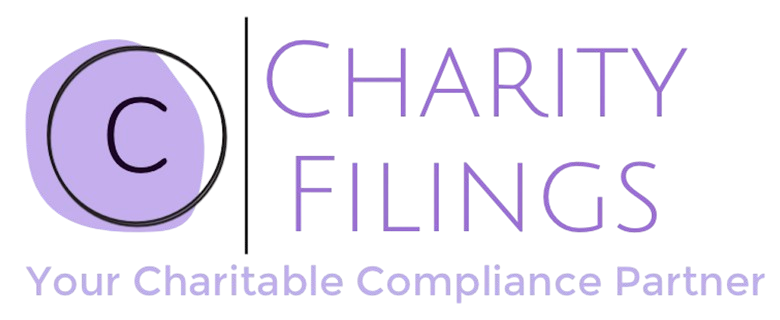Confused about which financial statements your nonprofit needs for state registration? Nonprofit financial statement requirements vary dramatically by state and organization size. This comprehensive guide explains exactly what type of financial statements each state requires based on your revenue or contribution levels.
Understanding Financial Statement Types
The Four Categories:
- Internally Prepared: Basic financial statements prepared by your organization’s staff or volunteers
- Compilation: Financial statements prepared by a CPA without verification or assurance
- Review: Financial statements prepared by a CPA with limited assurance procedures
- Audited: Financial statements prepared by a CPA with full examination and highest level of assurance
Cost and Complexity:
Financial statement requirements directly impact your compliance costs. Understanding thresholds helps you budget appropriately and avoid over-spending on unnecessary audit requirements.
Threshold Measurements:
States use different metrics to determine requirements:
- Total Contributions: Donations and grants received
- Total Revenue: All income including contributions, program revenue, and investment income
Important Note About State Requirements
These requirements apply to charitable solicitation registration filings. Your organization may have different financial statement requirements for:
- IRS Form 990 filing (federal tax requirements)
- Grant applications (funder-specific requirements)
- Board governance (internal oversight needs)
- Other regulatory filings (corporate, professional licensing, etc.)
This guide focuses specifically on what states require for charitable registration compliance.
Complete State Financial Statement Requirements
| State | Internally Prepared | Compilation | Review | Audited |
|---|---|---|---|---|
| Alabama | – | – | – | – |
| Alaska | – | – | – | – |
| Arkansas | – | – | Contributions $500k – $1M | Contributions ≥ $1M |
| California | – | – | – | Contributions ≥ $2M |
| Colorado | – | – | – | – |
| Connecticut | – | – | Revenue $500k – $1M | Revenue ≥ $1M |
| District of Columbia | – | – | – | – |
| Florida | – | – | Contributions $500k – $1M | Contributions ≥ $1M |
| Georgia | Contributions ≤ $500k | – | Contributions $500k – $1M | Contributions ≥ $1M |
| Hawaii | – | – | – | Contributions ≥ $500k or if Required by Other Agency |
| Illinois | – | – | Revenue $300k – $500k | Revenue ≥ $500k or if $25k & Professional Solicitor |
| Kansas | – | – | – | Contributions ≥ $500k |
| Kentucky | – | – | – | – |
| Louisiana | – | – | – | – |
| Maine | – | – | – | – |
| Maryland | – | – | Contributions $300k – $750k | Contributions ≥ $750k |
| Massachusetts | – | – | Revenue $500k – $1M | Revenue ≥ $1M |
| Michigan | – | – | Contributions $300k – $550k | Contributions ≥ $550k |
| Minnesota | – | – | – | Revenue ≥ $750k |
| Mississippi | – | – | Contributions $250k – $750k | Contributions ≥ $750k |
| Nevada | – | – | – | – |
| New Hampshire | – | – | Revenue $500k – $2M & New Hampshire Based | Revenue ≥ $2M & New Hampshire Based |
| New Jersey | – | – | – | Revenue ≥ $1M |
| New Mexico | – | – | – | Expenses ≥ $750k |
| New York | – | – | Revenue $250k – $1M | Revenue ≥ $1M |
| North Carolina | – | – | – | – |
| North Dakota | – | – | – | – |
| Ohio | – | – | – | – |
| Oklahoma | – | – | – | – |
| Oregon | – | – | – | Only if Required by Other Agency |
| Pennsylvania | Contributions ≤ $100k | Contributions $100k – $250k | Contributions $250k – $750k | Contributions ≥ $750k |
| Rhode Island | – | – | – | Revenue ≥ $1M |
| South Carolina | – | – | – | – |
| Tennessee | – | – | – | Revenue ≥ $1M |
| Virginia | – | – | – | – |
| Washington | – | – | – | – |
| West Virginia | – | – | Contributions $200k – $500k | Contributions ≥ $500k |
| Wisconsin | – | – | Contributions $500k – $1M | Contributions ≥ $1M |
Key Planning Considerations
Budget Impact:
The costs for nonprofit financial statements—whether compiled, reviewed, or audited—can vary widely based on factors like the organization’s size, complexity of financials, geographic location, and the accounting firm’s rates. Below are average cost estimates based on general trends.
- Internally Prepared: Minimal cost (staff time only)
- Compilation: $2,000 – $5,000 typically
- Review: $5,000 – $15,000 typically
- Audited: $15,000 – $50,000+ depending on organization size and complexity
Timing Requirements:
- CPA engagement should begin 3-4 months before filing deadlines
- Audit scheduling may require 6+ months advance planning
- Multi-state organizations need to meet the highest requirement among all registered states
Growth Planning:
- Monitor your thresholds – crossing revenue/contribution levels triggers new requirements
- Budget for transitions – moving from review to audit represents significant cost increase
- Professional guidance helps optimize compliance across multiple states
Common Compliance Challenges
Multi-State Organizations:
If you’re registered in multiple states, you typically need to meet the highest financial statement requirement among all your registered states. For example:
- Registered in Georgia and California: Need audited statements when contributions reach $1M (Georgia’s threshold), not $2M (California’s threshold)
- Cost optimization requires strategic state registration planning
Revenue vs. Contribution Measurements:
- Revenue states include all income (donations, program fees, investment income)
- Contribution states typically include only donations and grants (some exclude government grants)
- Understanding the difference prevents over-spending on unnecessary audit requirements
Threshold Timing:
- State thresholds are based on the financial information for the reporting year being filed (typically the most recently completed fiscal year)
- Planning ahead prevents scrambling for CPA services when thresholds are crossed
- Professional monitoring helps anticipate requirement changes
Understanding Your Requirements
Why This Guide Matters:
- Requirement clarity – know exactly what your state registrations require
- Budget planning – understand estimated financial statement costs before engaging CPAs
- Multi-state optimization – ensure you meet the highest requirement among all registered states
- Compliance preparation – have the right financial statements ready for registration filings
Planning Strategies:
- Know your thresholds – monitor when your organization will cross into higher requirement tiers
- Multi-state analysis – identify the highest requirement among all your registered states
- Advance planning – engage CPAs with sufficient time before registration deadlines
- Cost optimization – avoid over-spending on unnecessary audit levels
Need Help with Financial Statement Requirements?
Understanding state financial statement requirements is crucial for compliance planning and budgeting. Professional registration management ensures you submit the correct financial statements with your state filings.
Contact us for comprehensive compliance assistance:
Give us a call
Send us an email
📄 [Download PDF Version of This Guide →](printable reference for your files)
Managing registrations across multiple states? Our experienced team can help you understand financial statement requirements and ensure proper compliance across all your registered jurisdictions.

